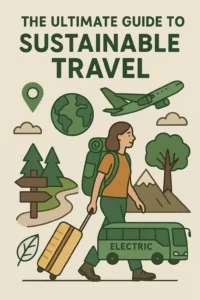Traveling opens our eyes to new cultures, landscapes, and experiences, but it also comes with an environmental and social footprint. Sustainable travel is about minimizing negative impacts while maximizing benefits for local communities and ecosystems. Whether you’re a backpacker, luxury traveler, or digital nomad, this guide will help you make ethical choices on your next adventure.

1. Choose Eco-Friendly Accommodations
Where you stay significantly affects your environmental impact. Look for green-certified hotels, eco-lodges, or homestays that prioritize sustainability. Many accommodations now use solar power, rainwater harvesting, and zero-waste policies. Websites like Green Key, BookDifferent, and Ecobnb specialize in eco-conscious stays. If possible, support locally-owned guesthouses instead of international chains to ensure your money benefits the community.
Pro tip: Ask about sustainability practices before booking—do they recycle? Do they avoid single-use plastics? Small efforts make a big difference.
2. Pack Light & Plastic-Free
Overpacking increases fuel consumption on flights and transportation. Stick to a capsule wardrobe with versatile, quick-dry clothing. Bring reusable essentials:
✔ Water bottle (collapsible ones save space)
✔ Utensils & straw (bamboo or stainless steel)
✔ Tote bag for shopping
✔ Solid shampoo bars (no plastic waste)
✔ Biodegradable sunscreen (reef-safe)
Avoid single-use plastics by packing snacks in silicone bags or beeswax wraps.
3. Support Local Economies
Tourism should empower communities, not exploit them. Instead of eating at global fast-food chains, dine at family-run restaurants and buy souvenirs from local artisans. Hire local guides instead of international tour companies—they offer authentic insights and fair wages.
💰 Where your money goes matters:
-
Markets > Supermarkets
-
Homestays > Resorts
-
Public transport > Private taxis
4. Respect Wildlife & Nature
Animal tourism often involves cruelty—avoid elephant rides, tiger selfies, or dolphin shows. Instead, visit ethical sanctuaries that rehabilitate animals. When hiking, stick to marked trails to prevent erosion, and never touch coral reefs while snorkeling.
🐢 Responsible wildlife experiences:
-
Sea turtle conservation (Costa Rica, Greece)
-
Ethical safaris (Kenya, Botswana)
-
Whale watching (Iceland, Canada)
5. Reduce Your Carbon Footprint
Transportation is the biggest contributor to travel emissions. How to minimize impact:
✈ Fly less, stay longer (or take trains/buses)
🚆 Use public transport (trains > flights for short distances)
🚲 Bike or walk when exploring cities
🌱 Offset carbon emissions (via Gold Standard or MyClimate)
If you must fly, choose direct flights (takeoff/landing burns the most fuel).
6. Learn & Respect Local Cultures
Sustainable travel isn’t just about the environment—it’s about cultural preservation. Research traditions before visiting sacred sites (e.g., covering shoulders in temples). Learn basic phrases in the local language—even “hello” and “thank you” go a long way.
🙏 Cultural etiquette tips:
-
Ask before taking photos of people
-
Dress modestly in conservative areas
-
Avoid haggling aggressively in markets
7. Leave No Trace
The golden rule of sustainable travel: Take only memories, leave only footprints.
🗑 Eco-friendly habits:
-
Carry a trash bag for litter (even if it’s not yours)
-
Avoid plastic water bottles—use a filter bottle
-
Pick reef-safe sunscreen (oxybenzone-free)
8. Volunteer & Give Back
If you want to help communities, choose ethical volunteer programs. Avoid “orphanage tourism” (which exploits children) and instead support education, conservation, or skill-sharing initiatives.
✅ Reputable volunteer organizations:
-
Workaway (cultural exchange)
-
WWOOF (organic farming)
-
Peace Corps (long-term impact)
9. Spread Awareness
Share your sustainable travel experiences! Post about eco-friendly businesses you loved, tag them online, and encourage others to travel responsibly.
📢 Ways to advocate:
-
Write reviews for green hotels
-
Share tips on social media (#SustainableTravel)
-
Educate fellow travelers
10. Keep Improving
Sustainability is a journey, not perfection. Even small changes—like refusing a plastic straw or taking the train—add up. Every responsible choice helps protect the places we love.
Final Thought
Sustainable travel isn’t about sacrifice—it’s about better experiences. By supporting local communities, reducing waste, and respecting nature, you’ll have richer, more meaningful adventures.
🌍 Ready to travel sustainably? Start today!
